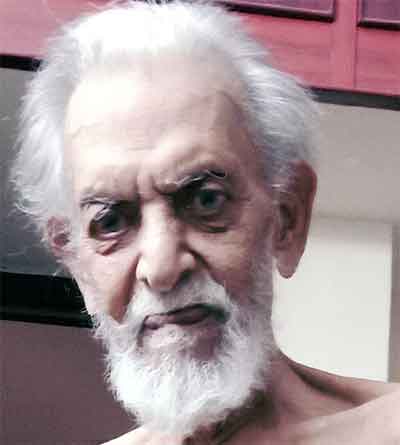
S. N. Nagarajan passed away in Chennai on 24 May morning. He was ninety-five years old, but intellectually active right to the end. Popularly known as SN (Sathyamangalam Nagarajan) his circle of friends was vast and varied. His role in popularising Marxist philosophy and political ideology among the people is widely recognised in Thamizhakam. He was a prolific writer in Tamil and his collection of essays in English titled “Eastern Marxism and other Essays” sought to infuse new breath into Marxist theory. He was a remarkable scholar who tried to popularise radical theory and practice among the people up to his last breath.
SN was a scientist by training, though he worked as a professional scientist only for little time. His ideas on people and science made him take incompatible positions vis á vis science promoted by the establishment. His views on major macro initiatives like ‘Green Revolution’ taken when it was still in the initial stage of implementation were amazingly insightful. SN had with clarity arrived at the political, economic, and ecological future consequences of this ‘revolution’ which all have been borne out in reality. The chronic dependency syndrome which has strangled Indian agriculture is created and reinforced by this ‘revolution’, SN staunchly believed.
SN’s association with Marxism was lifelong. As a young scientist he was active in the people’s science trend among scientists. This naturally led him to the communist movement. At the same time, his participation in the activities of the undivided CPI was not uncritical. Subsequently, when the Dravidian movement took roots and spread out in Tamizhakam his position about the CPI’S approach to the movement was openly critical leading to a drifting away from the CPI. He had the rare experience of being a part of all the three main trends in the Indian communist movement – the CPI, the CPI (M) and the CPI (ML). His investigation into the lacunae of the communist movement drew on all these experiences apart from theoretical investigations concerning Marxist philosophy.
The collapse of attempts to build socialism in countries where political revolutions could be successfully executed by the communists resulting in the restoration of capitalism has prompted many radical intellectuals to ponder on what went wrong with revolutionary theory and praxis. SN is one of them. His “Eastern Marxism …” addresses this question. According to him, the emphasis was on developing productive forces rather than revolutionising the relations or production which only can advance societies on the path of socialism and communism. One-sided emphasis on productive forces without revolutionising the relations of production is essentially the capitalist solution of social and economic management and when Marxists embrace this path, as they did in Soviet Union and China, the result can only be resurgent capitalism with all its dynamics, inequities, and distortions.
In the context of India SN paid much attention to the need to base our radical philosophical investigations to our own roots which was never done by the communists. He identified and analysed the materialist streams in Indian philosophy, i.e., he sought for what is progressive in Indian philosophical traditions. His investigations probably did not produce a holistic body of philosophical knowledge, but they posed several important questions which need to be further investigated. It is of great importance that Indian Marxists should self-critically evaluate their Euro-centrism and draw lessons from their own past. SN was acutely conscious of this importance.
Eurocentric understanding of social change depended solely on borrowed ideological and methodological tools of analysis which made the Indian communists pay scant or no attention to study the concrete conditions existing here. This anti-Leninist position made them embrace mechanical materialism as a very convenient methodological tool, which in turn could justify any and every sort of political opportunism. The history of the communist movement in the country is replete with blunders which has caused great harm to it. SN’s perception of this history was very sharp.
T G Jacob is a freelance Journalist and a social activist
Related posts:
Related posts:
Views: 0
 RSS Feed
RSS Feed

















 July 14th, 2021
July 14th, 2021  Awake Goy
Awake Goy  Posted in
Posted in  Tags:
Tags: 
















